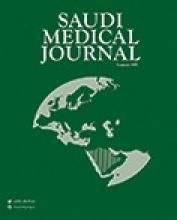SYSTEMATIC REVIEW
Factors associated with smoking cessation and smoking cessation interventions in the Gulf Cooperation Council countries
Monshi & Halpern examine published literature describing the predictors of smoking cessation (SC) and cessation interventions in Gulf Cooperation Council (GCC) countries. Individual-level factors were access and cost of SC medications, knowledge about harms, concern about health, self-efficacy, perceived stress, level of tobacco consumption, belief about SC medications, clinician advice, social support, and enforcement of smoke-free ban. Clinician-level factors were time to provide counseling, training to assist patients, patient acceptance, best practice for treating patients, resources, perception related to responsibilities, and knowledge about effective medications.
see page 119
Preferred Reporting Items for Systematic Reviews and Meta-Analyses (PRISMA) flow diagram depicting the selection of papers at each stage
ORIGINAL ARTICLES
Investigating the epidemiology of medication errors in adults in community care settings. A retrospective cohort study in central Saudi Arabia
Assiri et al investigate the period prevalence and risk factors for clinically important prescription and monitoring errors among adults managed in community care in Saudi Arabia (SA). The overall period prevalence of medication errors over 15 months was 8.1% (95% confidence interval [CI] 6.5-9.7). Risk factors that significantly predicted overall risk of patients experiencing one or more medication errors were: age ≥65 years, male gender, Saudi nationality, and polypharmacy (defined as the concurrent use of ≥5 drugs). They conclude that clinically important medication errors were commonly observed in relation to both drug prescription and monitoring.
see page 158
Family medicine residents in central Saudi Arabia. How much do they know and how confident are they in performing minor surgical procedures?
Andijany & AlAteeq explore the knowledge, practice, barriers and reported self-confidence of family medicine (FM) residents in Riyadh, Kingdom of Saudi Arabia, in performing minor surgical procedures (MSP). The response rate was 71.9%. Residents had a mean knowledge score of 15.75% and a mean interest score of 10.4 out of 12. Out of 23 MSPs surveyed, residents had performed a mean average of 9.18. The mean of residents’ confidence scores was 26.6 out of 63. The most common barrier to performing MSPs was a lack of training (n=115; 59.9%), while the least common barrier was a lack of interest (n=113; 58.9%). They conclude that a majority of FM residents were interested in MSP, but had low perceived knowledge, low reported confidence and infrequent practice.
see page 168
Bivariate analysis (p-value)
CASE REPORT
Methionyl-tRNA synthetase novel mutation causes pulmonary alveolar proteinosis
Alzaid et al present a 6-month-old boy with unexplained persistent respiratory distress and failure to thrive since birth. He was delivered at 36 weeks of pregnancy, with a symmetrical intrauterine growth retardation (IUGR). Presenting with shortness of breath, persistent cough and intermittent fever, our patient was treated in different district hospitals as a case of bronchiolitis, pneumonia, recurrent wheezing and possible asthma. He received multiple courses of antibiotics, nebulized bronchodilators and inhaled steroids with no response. Also, he was diagnosed with gastroesophageal reflux disease (GERD) based on a barium meal findings associated with shortness of breath and cough after feeding. However, he did not show an improvement following anti-reflux management and nasogastric feeding. Despite an optimum nutritional management with a high protein and calorie formula, he continued to have failure to thrive.
see page 195
Chest CT scan showing extensive dependent atelectasis and airspace disease by air bronchogram suggestive of aspiration disease, Hounsfield unit (+30-65).
- Copyright: © Saudi Medical Journal
This is an open-access article distributed under the terms of the Creative Commons Attribution-Noncommercial-Share Alike 3.0 Unported, which permits unrestricted use, distribution, and reproduction in any medium, provided the original work is properly cited.









